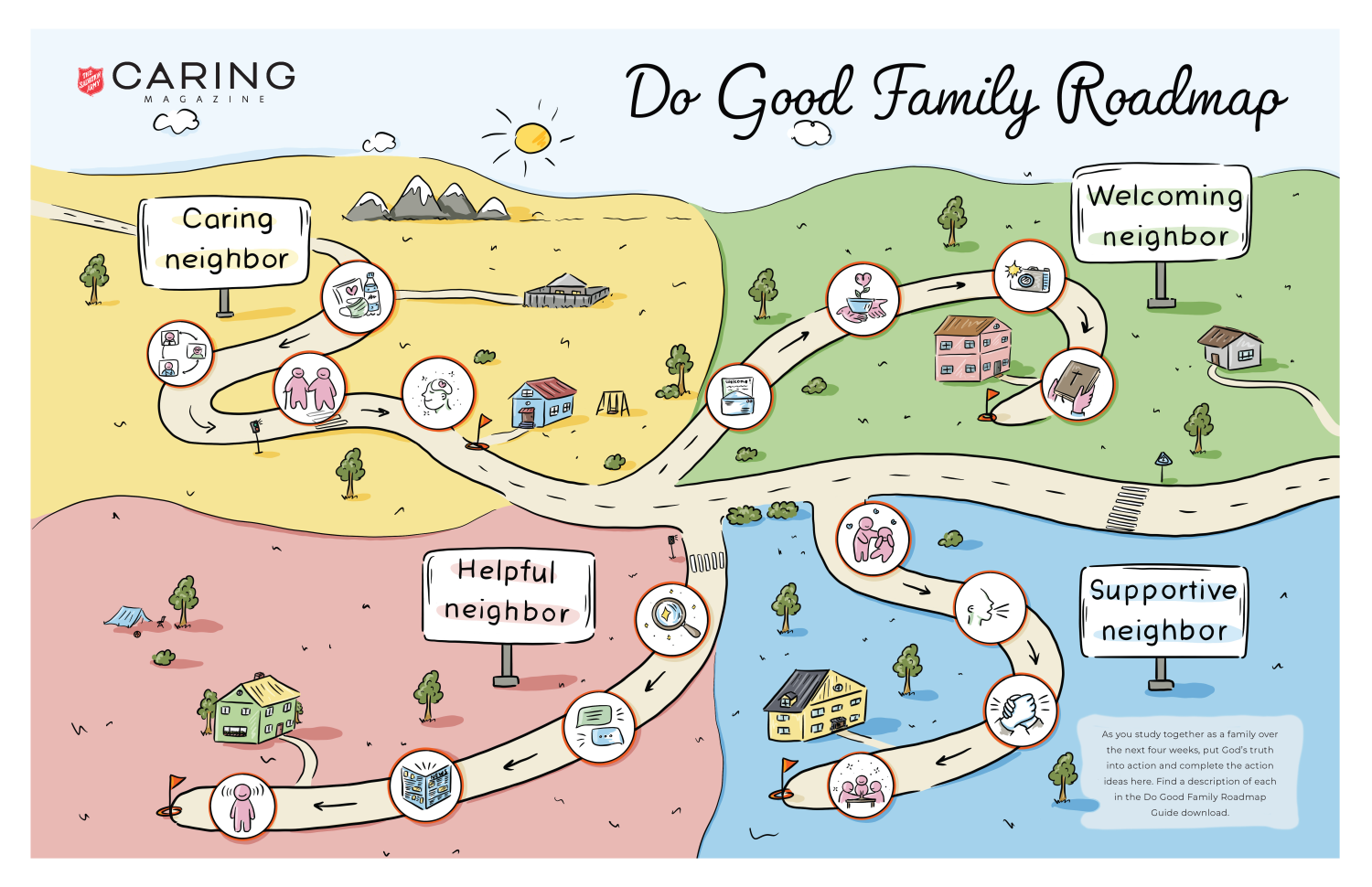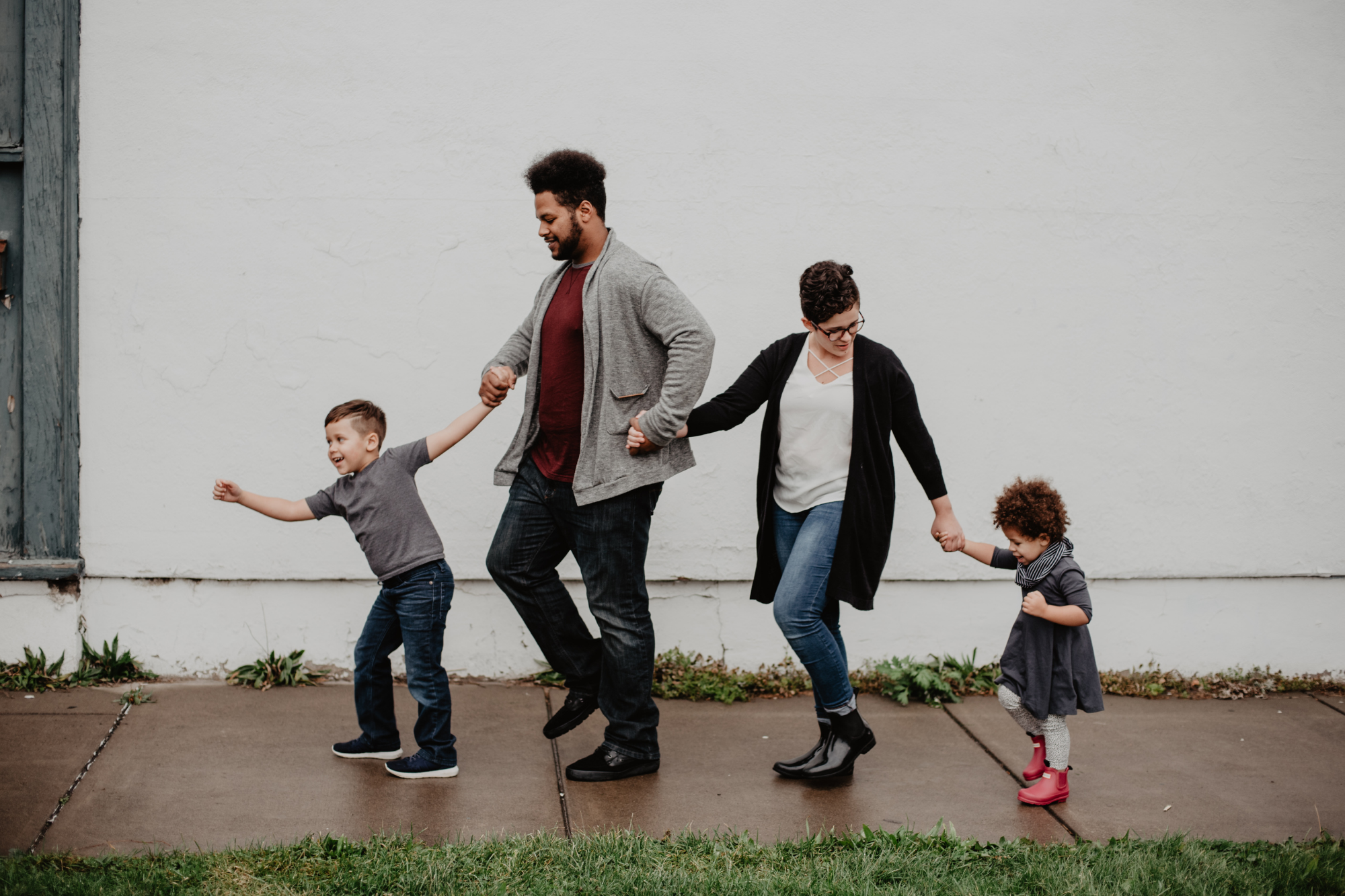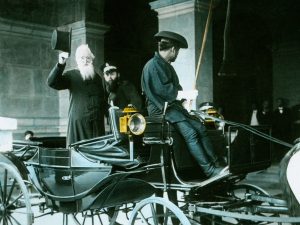As kids, our two favorite shows were “Sesame Street” and “Mister Rogers’ Neighborhood.” Both shows invited us into different worlds and introduced us to people we had never seen before. Mister Rogers, especially, was intentional about inviting lots of different people into his home. He was famous for calling everyone his neighbor.
You may be wondering: “How could everyone be my neighbor?”
It’s true, we tend to think of the people who live near us as our neighbors, not everyone. But God invites us to see and treat every person we meet with love and kindness as if they were our next-door neighbor.
Most of us would rather pick and choose who our neighbors are because it is hard to love everyone. Yet, throughout the Bible, God continually calls us to love everyone, to care for them and even invite them into our homes.
Over the next four weeks, journey with us in this study to see what God says about how to love our neighbors.
Each week includes five steps to follow with your family:
STEP 1: Prepare Your Heart—put away distractions and pray for God to show you something new.
STEP 2: Learn from the Word—read a passage of Scripture together.
STEP 3: Ask Questions—discuss the verses together as a family using the question prompts.
STEP 4: Name the Truth—discover the truth God wants you to take away using the reading thought material provided.
STEP 5: Take Action—think of ways you can put God’s truth into action and complete the action ideas on your Do Good Family Roadmap. (Consider setting a family reward for completing the full roadmap, such as an ice cream outing. Get input from your family and let everyone know you’ll enjoy the reward when you complete the neighborly actions as a family.)
So, in the words of Mister Rogers, “Would you be mine, could you be mine, won’t you be my neighbor,” as we journey through God’s Word?
Part one of four.
A Caring Neighbor
Who is my neighbor?
STEP 1: Prepare your heart.
Put away distractions and pray, “God show us something new today.”
STEP 2: Learn from the Word.
As a family, read what Scripture says in Luke 10:25-37.
STEP 3: Ask questions.
Discuss the passage together as a family. Consider:
- How was the injured man treated by his neighbors?
- How would you want to be treated if you were hurt?
- If you see a friend who is sad at school what could you do to help?
- Why is it important to treat everyone with kindness?
STEP 4: Name the truth.
Discover the truth God wants you to take away. Use the following as a guide:
Jesus could have given a very simple answer to the legal expert, but Jesus wanted him to think deeper about this question. The expert didn’t really want to know who his neighbors were. He wanted Jesus to tell him that it was OK to pick and choose who our neighbors are based upon old rules and traditions.
The parable, or story, that Jesus told helped the expert (and us!) get a fuller picture of who our neighbors are—and how we can treat them with love and kindness.
- The first person who comes by is a priest or pastor. We would all expect a priest or a pastor to stop, but this pastor doesn’t even look at the man to see if he can help. Instead, he crosses the road because he doesn’t want anything to do with this injured man. Things were a little different in Jesus’ time, and pastors or priests had certain rules they had to follow about dead or injured people. But the pastor still made the choice not to help.
- The second person that came by was a Levite, someone whose job it was to take care of the church and do ministry. Surely this person would stop, but no! The Levite did the same thing as the pastor, he didn’t try to help the man at all. Instead, he crossed over to the other side of the road. This road was known as a dangerous place to be, and the priest and the Levite might have been scared they could get beat up too. But they chose their own safety and security over this injured man.
- Thankfully a third man came by, and it is very important that Jesus calls him a Samaritan. Most Jewish people and Samaritans hated each other and lived completely separate lives. They didn’t live in the same area, eat together, work together or even talk to each other. In fact, if a Jewish person was injured, they might not have even let a Samaritan touch them to help. But it is the Samaritan who sees the pain of this injured man and crosses the street to help him.
Not only does the Samaritan pick the man up, but he also bandages his wounds, takes him to an inn and pays for all of his care! That would be like if you saw someone on the side of the road, picked them up, drove them to the hospital and paid for all of their medical bills. How amazing is that? The person who the legal expert hated, and looked down upon, was the only one who had compassion for the injured man.
At the end of the parable, Jesus asks the legal expert which one of the people was a neighbor to the injured man. The legal expert only has one option, but he could not even say the name Samaritan. Instead, he says, “the one who showed him mercy,” and Jesus tells him to go and do the same thing.
Our neighbors cannot be defined by rules or regulations, and neither can our love. God asks us to show everyone mercy and love in Jesus’ name and to treat everyone as our neighbor.
 STEP 5: Take action on your Do Good Family Roadmap.
STEP 5: Take action on your Do Good Family Roadmap.
Put God’s truth into action and be a caring neighbor this week with these action ideas (and don’t forget to mark them complete on your roadmap—download it here!):
- Make a kindness kit. Have you ever been to a gas station with your family and seen someone who looked like they could use some basic necessities? Create a “kindness kit” to keep in your car and give to someone in need. You could add hand sanitizer, socks, masks, wipes, granola bars, a water bottle, other goodies, and even an encouraging handwritten note and gather them in a Ziploc bag. Then next time you see an individual who could use some kindness, hand over a kit and tell them you hope it brightens their day.
- Name your neighbors. Can you name your actual neighbors? The people who directly next to your house or apartment? What about where they work, where they are from, how long they’ve lived there or what they do for fun? How about their dreams for the future, their faith or experience with God? See if you can complete the block map and find additional resources to get to know your neighbors at artofneighboring.com.
- Make caring a focus. Start conversations about the caring and uncaring acts you see in your daily lives or on television. Talk about why you think these actions are caring or uncaring.
- Identify feelings. Help your family name difficult feelings such as frustration, sadness and anger and encourage them to talk to you about why they’re feeling that way. Set an example and identify your own feelings, appropriately, to your kids as well.
Download the complete Do Good Family Roadmap now and take a 4-week journey for families in how to be a good neighbor. Follow the guide to see what the Bible says about the art of neighboring and take tangible steps together on your printable roadmap to be a caring, helpful, welcoming and supportive neighbor right where you are.
Do Good:
- How do we treat everyone with love and kindness, as if they were our neighbor? Get the Do Good Family Roadmap and take a 4-week journey for families in how to be a good neighbor. Follow the guide to see what the Bible says about the art of neighboring and take tangible steps together on your printable roadmap to be a caring, helpful, welcoming and supportive neighbor right where you are.
- You’ve probably seen the red kettles and thrift stores, and while we’re rightfully well known for both…The Salvation Army is so much more than red kettles and thrift stores. So who are we? What do we do? Where? Right this way for Salvation Army 101.
- Get support from moms who are right there with you. Join the Caring Moms Collective and find a place of low-pressure, high-encouragement love anytime you need it, whether you know it or not. Get in the group today.












